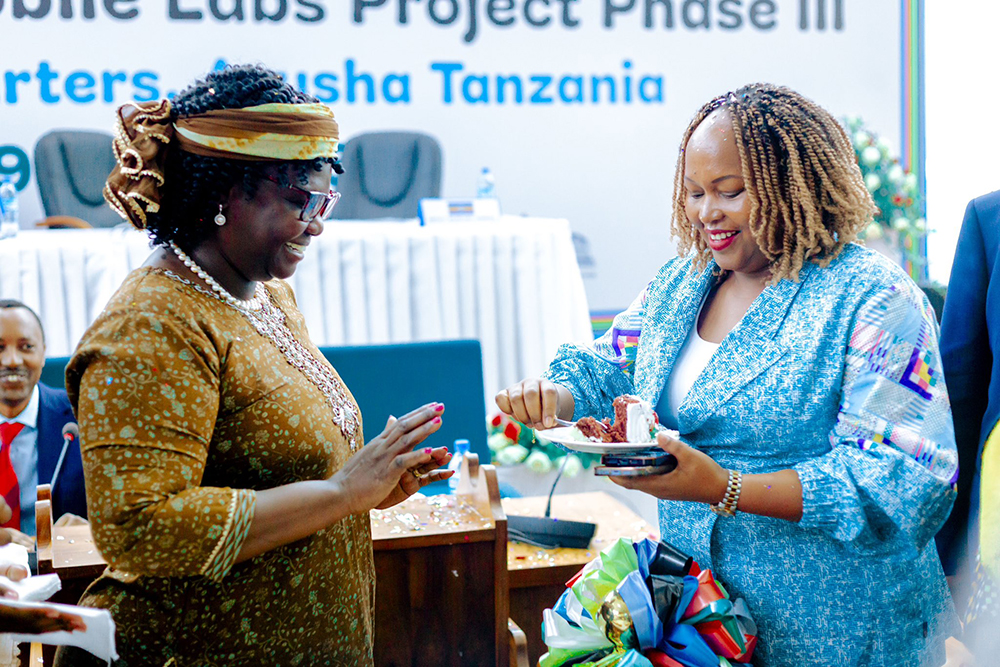EAC unveils third phase of disease network lab project
The three-year project, running from July 2025 to July 2028, is supported by the German Government through KfW, the German Development Bank, with funding amounting to €12m.
Stakeholders pose for a group photo after the official launch of Phase III. (Courtesy)
Dallen Namugga
Journalist @New Vision
_____________
The East African Community (EAC) has officially launched Phase III of its regional network of reference laboratories for communicable diseases project.
The project is a major initiative aimed at strengthening pandemic preparedness and response across the region through improved laboratory capacity and surveillance systems.
The three-year project, running from July 2025 to July 2028, is supported by the German Government through KfW, the German Development Bank, with funding amounting to €12m.
It will focus on advancing early detection of infectious diseases, rapid outbreak response and promoting cross-sectoral co-operation under the One Health approach, which integrates human, animal and environmental health.
Speaking during the launch at the EAC headquarters on May 10, 2025, in Arusha, Tanzania, the chairperson of the EAC Council of Ministers and Kenya’s Cabinet Secretary for EAC Affairs, Beatrice Askul Moe, emphasised the importance of collaborative health systems in tackling disease outbreaks.
The Chairperson of the EAC Council of Ministers and Kenya’s Cabinet Secretary for EAC Affairs, Hon. Beatrice Askul Moe. (Courtesy)
“As EAC partner states, we acknowledge the significant progress made so far to combat disease outbreaks and surveillance, especially diagnostic services under the mobile laboratories project,” Moe said.
According to Moe, this project has contributed significantly to preventive efforts for diseases like COVID-19, mpox, marburg, and Ebola.
The newly launched phase builds on achievements of the previous two phases. Since 2017, the EAC has deployed 10 mobile laboratories across its member states, supported over 53 outbreak responses, including Ebola, Rift Valley Fever, COVID-19, and Marburg.
It has also strengthened anti-microbial resistance (AMR) surveillance.

(L-R) The Chairperson of the EAC Council of Ministers and Kenya’s Cabinet Secretary for EAC Affairs, Hon. Beatrice Askul Moe, with EAC Secretary General, Hon. Veronica Nduva, during the launch. (Courtesy)
Phase III new components
Operationalisation of a regional centre of excellence for virology at the Uganda Virus Research Institute (UVRI), to serve as a central hub for virology research and training.
Upgrade of existing mobile labs to One Health mobile laboratories to address both human and animal health, and facilitate joint human-animal health conferences.
Enhancement of genomic surveillance capabilities across national and regional levels for better detection of emerging pathogens.
Inclusion of the Democratic Republic of the Congo (DRC) into the EAC mobile laboratory network, as well as procurement of eight new mobile lab units for animal health.
EAC secretary general, Veronica Nduva, said mobile labs deployed in outbreak hotspots have been instrumental in reducing the time between sample collection and result release.
“Timely test results guide physicians for proper patient management and accurate data for surveillance,” Nduva said.
She added that this boosts not just health outcomes, but also trade and movement across the EAC Common Market.
Germany’s head of co-operation at the Tanzanian embassy, Julia Kronberg, reiterated her country’s commitment to regional public health.

Germany’s Head of Cooperation at the Tanzanian Embassy, Julia Kronberg. (Courtesy)
“This launch marks another milestone in our long-standing co-operation in pandemic preparedness,” Kronberg said.
In addition to the lab network, the German-supported PanPrep project, implemented through GIZ, continues to build capacity in hygiene, crisis communication, and rapid disease response, aligning with global pandemic preparedness frameworks.
EAC comprises eight member states: Burundi, Kenya, Rwanda, South Sudan, Tanzania, Uganda, the Democratic Republic of the Congo, and Somalia.